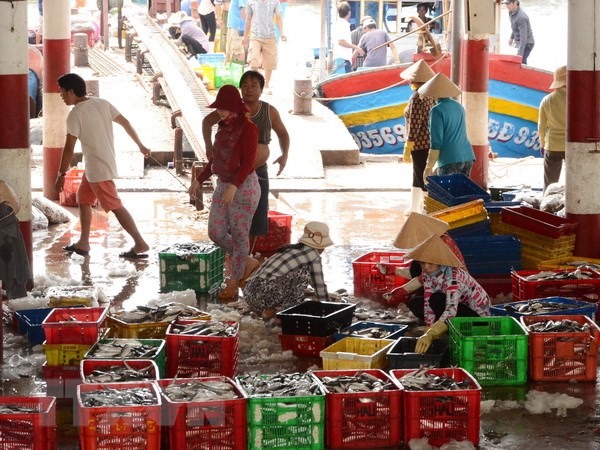 Economy
Economy

Việt Nam has perfected the legal framework of nine recommendations issued by the European Union (EU) to ensure responsible and sustainable fishing.
 |
| A corner of Incomap Port in the southern province of Bà Rịa - Vũng Tàu. — Photo Hoàng Nhị |
HÀ NỘI — Việt Nam has perfected the legal framework of nine recommendations issued by the European Commission (EC) to ensure responsible and sustainable fishing.
This was revealed by Minister of Agriculture and Rural Development Nguyễn Xuân Cường in Hà Nội on Monday.
The contents of the nine recommendations were incorporated into the Fisheries Law and passed by the National Assembly, said Cường at a meeting with the Directorate of Fishieries (DF) to re-evaluate the results achieved by Việt Nam in overcoming the EU’s illegal, unreported and unregulated fishing (IUU) yellow card on Vietnamese fisheries, as well as to welcome the EU inspection team visiting Việt Nam today (May 15) to check the country’s efforts against IUU fishing.
"This is a great step that Việt Nam has done so far to confirm to the EC that it is building sustainable and responsible fisheries and raising the incomes of fishermen," said Cường.
On October 23, 2017, the EU officially issued the yellow card against Vietnamese seafood exported to this market because of insufficient efforts to meet the EU regulation to prevent, deter and eliminate IUU. At the same time, the EU recommended that Việt Nam make sufficient efforts for the withdrawal of the “yellow card” by revising its legal framework and ensure compliance with international and regional rules applicable to the conservation and management of fisheries resources.
EU wanted Việt Nam to ensure the implementation and enforcement of the revised national legislation and enhance the implementation of international rules and management measures through a full sanctioning regime and an enforcing and monitoring system.
It also required Việt Nam to address deficiencies identified in the monitoring, control and surveillance (MCS) related to the requirements of international and regional regulations, as well as within the framework of the fishing certification system, in addition to strengthening the management and improvement of the registration and licensing system for fishing.
General Director of DF Nguyễn Ngọc Oai said the EU inspection delegations would work with MARD, some coastal provinces and export aquatic products today. The delegation would also work with the Department of Animal Health, Department of Quality Management of agro-forestry and fisheries.
Finally, the EU team will synthesise the results achieved in Việt Nam and report to the Minister of MARD, said Oai.
To serve the EU’s inspection team visiting Việt Nam, Oai said the DF had opened an IUU office, which had sufficient documents to serve the EU. In particular, the DF has also set up a fishery database system, including a system of fishing ports and fishing vessels and the fishing vessel monitoring system on the fishing grounds, which are important for the management of fishing vessels on the sea.
"The MARD’s view is that the units under the ministry, when working with the EU team, will have the highest responsibility, transparency and openness. It’s needed to verify what we have done for EU to check,” Cường said.
We have nothing to hide. We need to record EU what we have done and what are inadequacies needed to be overcome in the next time,” he added.
In term of management, Cường said it’s necessary to re-assess the facilities for sustainable development of fisheries such as ports and anchorage areas to issue recommendations to the Government.
“In the next period, it is necessary to further invest in the sector to create a responsible and effective fishery. We also need to review the application of high technologies, information technology application to manage vessels and fishing grounds so as to ensure the development of modern fisheries,” Cường said.
To date, Việt Nam has made great efforts in overcoming the "yellow card" of the EU. It has directed drastically from central to local grassroots to implement more comprehensive solutions to overcome nine recommendations that the EU put forward to remove the "yellow card" as well as reaching a responsible fishery. — VNS




